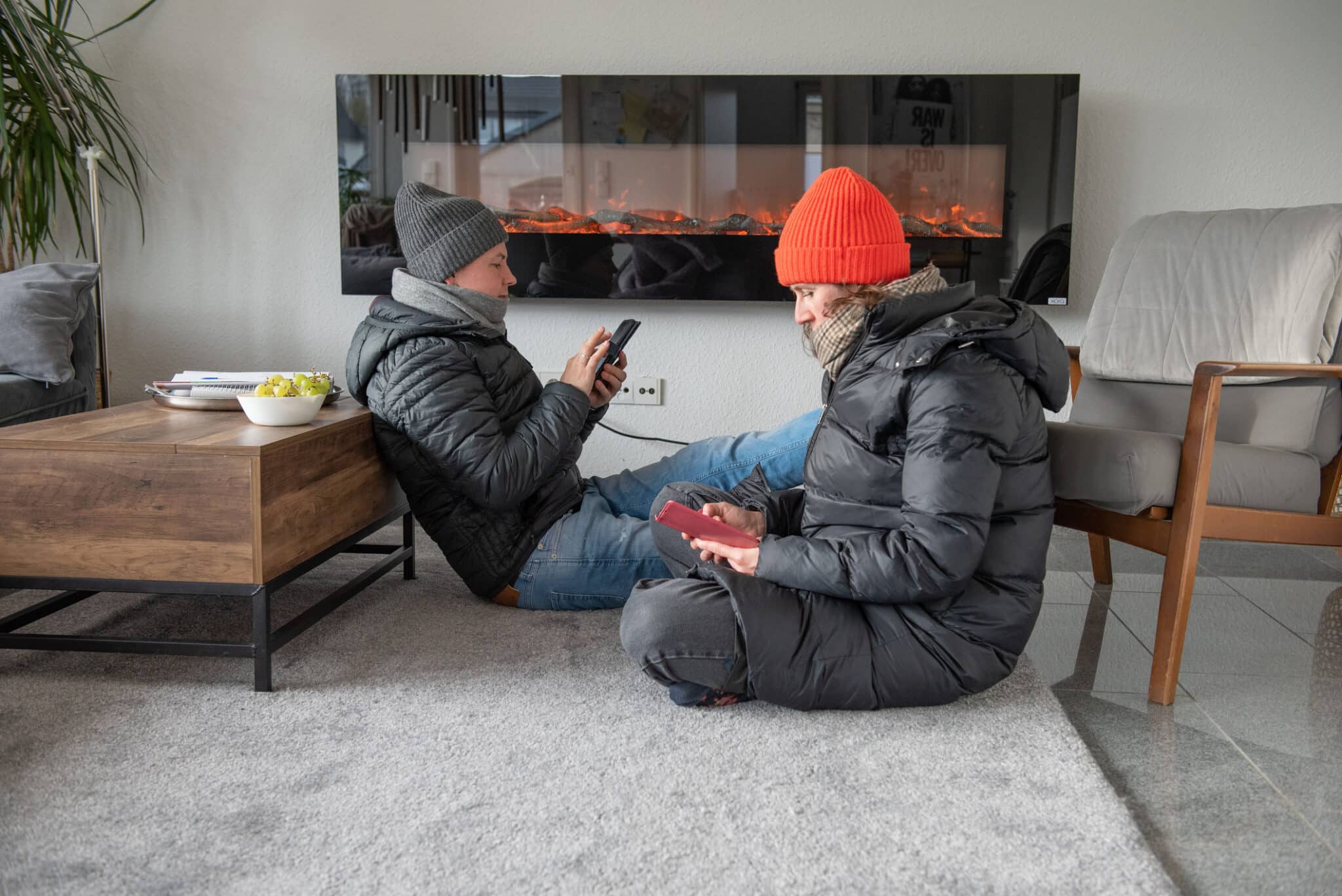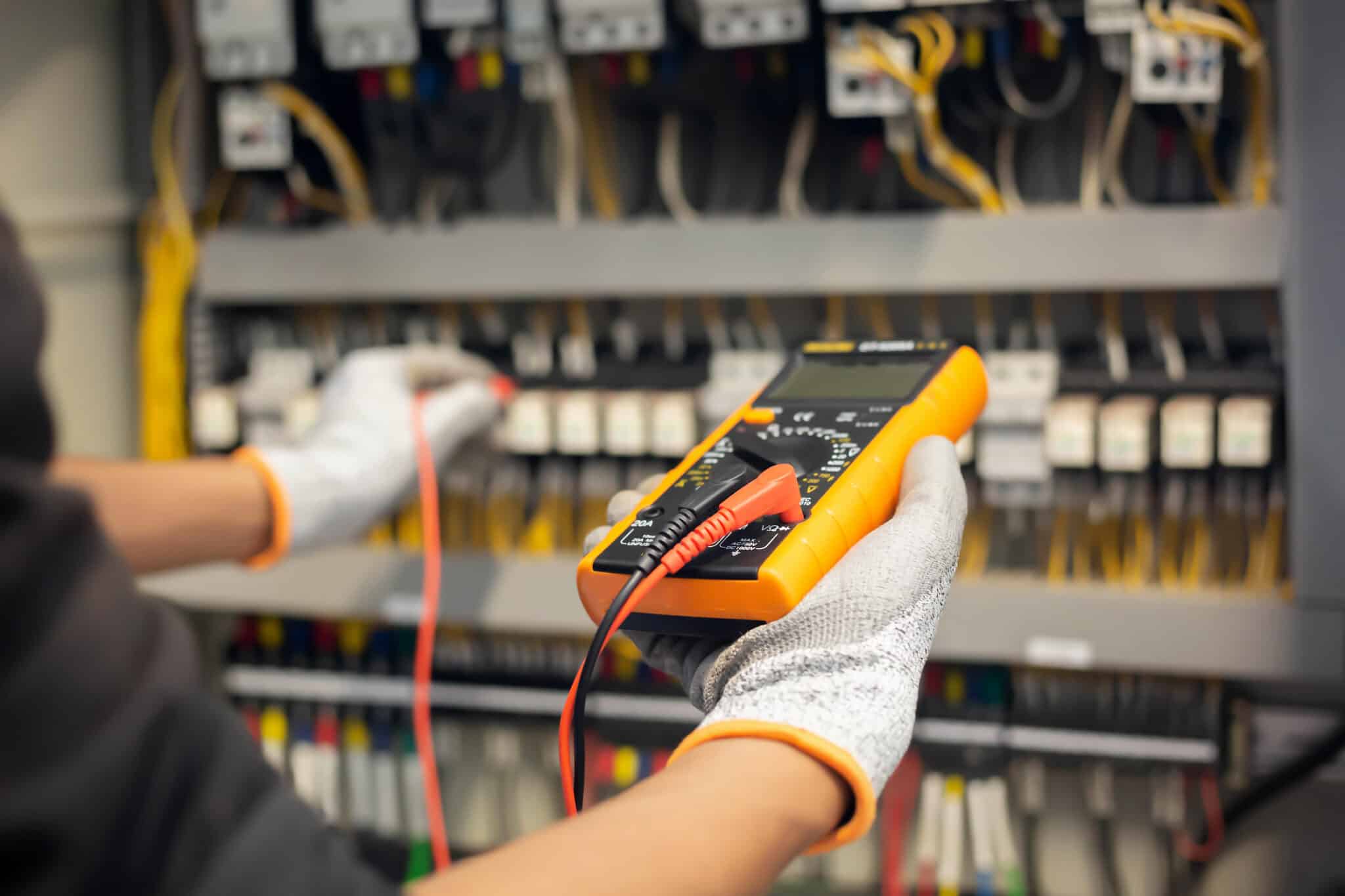Curious how cold weather impacts your home’s electrical systems? When winter sets in, your home’s wiring and electrical systems face unique challenges. From the heavy load of heating appliances to powering extra lights on shorter days, colder temperatures can put surprising strain on electrical systems and wiring setups.
Understanding these seasonal effects on your electrical systems can help you prevent problems and keep everything running smoothly throughout winter’s coldest months. Let’s explore why winter is so demanding on electrical systems and how to manage the extra load safely!

Why Cold Weather Puts Extra Strain on Electrical Systems
Wintertime in areas like Charleston and Summerville brings added pressure to home electrical systems. Colder weather means increased use of devices that consume more power, and shorter days only heighten the demand for warmth and lighting. Here’s how and why cold weather strains your home’s electrical setup.
Increased Demand for Heating Devices
As temperatures drop, reliance on heating devices like central heating, space heaters, and electric blankets rises. These appliances draw a significant amount of power, pushing home circuits to their limits.
Overloaded circuits are more prone to tripping, especially in systems unaccustomed to handling such high demands. While essential for staying warm, heating devices can easily tax an older or smaller electrical setup. For many homes, this spike in power usage presents a seasonal challenge.
More Frequent Use of Power Outlets and Appliances
With more time spent indoors, outlets and power strips see extra action as families plug in more devices like phones, tablets, TVs, and gaming consoles. This consistent, high-demand use can wear on outlets, leading to overheating or even outlet damage if left unchecked.
Overusing power strips also add stress to your home’s wiring, particularly if outlets aren’t built to handle a heavy load. The cumulative impact on outlets and circuits may not always be visible but steadily builds over winter. Each of these factors strains a system that may already be working at capacity.
Shorter Days, Higher Lighting Use
Shorter days in winter mean more lighting is needed for longer periods, from brightening workspaces during the day to powering up festive holiday lights at night. The added use not only wears out bulbs faster but also increases strain on circuits, especially if connected to older wiring.
When lighting demands pile onto other seasonal power needs, it’s no surprise that some systems start to falter. This prolonged lighting use also heightens the risk of flickering lights or circuit overloads. For many households, managing this load is key to a safe, well-lit winter.
Common Cold-Weather Electrical Issues
Cold weather often brings common electrical issues that are especially noticeable in winter months. These problems can range from annoying to potentially hazardous, making it essential to recognize and address them early.
Circuit Breaker Tripping
During winter, circuit breakers may trip more frequently due to the increased demand on your home’s power supply. High-use appliances like heaters, combined with holiday lights and additional lighting, can overload circuits quickly. When a breaker trips, it’s a safety feature to prevent overheating and potential fire risks.
However, frequent tripping signals that your system is struggling to handle the load. Resetting the breaker is fine occasionally, but recurring trips indicate it’s time to reduce demand or upgrade your system.
Power Surges from High Appliance Use
With more devices running simultaneously, power surges become more common in colder months. Appliances like space heaters, microwaves, and large kitchen devices can create small surges when turning on and off, which may harm sensitive electronics over time.
A surge can cause flickering lights, but in worse cases, it may damage plugged-in devices. If you notice regular surges, consider using surge protectors for valuable electronics. This added protection helps prevent damage and prolongs the life of your appliances.
Outlets and Switches Becoming Loose or Damaged
Extra use during winter can cause wear and tear on outlets and switches, leading them to become loose or even slightly damaged. Loose outlets can increase the risk of sparking or short circuits, posing a potential safety hazard.
Damaged or loose switches may also flicker or make a buzzing sound, indicating an internal issue. Regularly inspecting these fixtures can help catch issues before they escalate. Addressing loose or damaged outlets early reduces fire risks and ensures reliable performance.
Outdoor Electrical Damage
Winter weather can also impact outdoor electrical systems, with cold temperatures and moisture affecting wiring, lights, and outlets. Ice, rain, and wind can damage outdoor wiring or connections, leading to potential shorts or malfunctions. Outdoor outlets and light fixtures are particularly vulnerable if not adequately protected from the elements.
Using weatherproof covers and ensuring all connections are secure can help prevent outdoor electrical issues. Proper maintenance of outdoor systems helps avoid sudden outages and keeps your home safe.
How to Protect Your Home’s Electrical Systems in Cold Weather
Preparing your home’s electrical systems for cold weather can help prevent common winter issues and keep everything running safely and smoothly. Taking a few proactive steps can reduce strain on your circuits and protect valuable devices from seasonal wear.
Check Your Home’s Circuit Load Capacity
Understanding your home’s circuit load capacity is essential, especially with the increased demands of winter. Checking this capacity helps determine if your system can handle high-power appliances like space heaters and holiday lighting without tripping.
For older homes, the existing setup might not support the modern load, which means it could be time to upgrade. A professional electrician can help assess your load capacity and recommend adjustments. Ensuring your system meets your needs helps prevent overloads and keeps your home safer.
Use Surge Protectors
With the uptick in appliance use, surge protectors offer an extra layer of safety for your electronics and home electrical systems. Surge protectors prevent sudden power spikes from damaging sensitive devices like computers, TVs, and kitchen appliances.
In winter, when the risk of surges increases, using these protectors can reduce wear on equipment and save you from costly replacements. Simple and effective, surge protectors are a small investment with a big impact. Make sure to use certified protectors for the best results.
Inspect Outlets and Switches Regularly
Extra use of outlets and switches during colder months can cause wear, making regular inspections a valuable habit. Check for loose or discolored outlets, which could indicate a problem, or feel for warmth around switches, which might suggest overload.
A quick inspection each month helps you catch issues early before they become safety concerns. Replacing worn outlets and switches keeps your home’s electrical systems running smoothly. Routine maintenance on outlets ensures they’re ready for the extra winter load.
Protect Outdoor Electrical Equipment
Winter weather can be tough on outdoor electrical equipment, with moisture and cold affecting outdoor lights, outlets, and cables. To keep outdoor equipment safe, use weatherproof covers and ensure all wiring is secure and dry.
Checking and reinforcing any exposed wiring can help reduce the risk of electrical shorts due to ice, rain, or snow. This extra step keeps your outdoor lighting and fixtures working safely. Taking the time to protect outdoor systems prevents unexpected breakdowns and ensures durability.
Keep an Eye on Your Electrical Panel
Your electrical panel is the heart of your home’s system, so monitoring it during winter can help prevent problems before they escalate. Periodically checking for signs of tripping breakers or unusual warmth around the panel can alert you to any issues with load management.
If you notice frequent tripping or an unusual smell, it may be a sign that the panel is overworked and could benefit from an upgrade or repair. Monitoring the panel keeps your system ready for winter’s demands and offers peace of mind.
Signs of Electrical Issues Caused by Cold Weather
Cold weather can reveal underlying issues in your home’s electrical systems that may go unnoticed during warmer months. Spotting these warning signs early can help you avoid costly repairs or dangerous situations.
Flickering Lights
Flickering lights are often one of the first signs that your electrical systems are struggling under winter’s demands. This can happen when circuits are overloaded by appliances like heaters or when there’s an inconsistent power flow.
While occasional flickering might not be a big deal, regular flickering indicates a possible wiring or circuit issue that needs attention. Addressing it quickly can prevent further wear and avoid potential safety risks. Flickering lights can signal that your system is under strain.
Warm Outlets or Switches
If outlets or switches feel warm to the touch, this can indicate an overloaded circuit or loose wiring. Warmth around outlets is often caused by excessive use or power-hungry appliances, which can lead to overheating.
While a slight warmth might be okay for certain appliances, consistent heat points to a problem that requires inspection. Ignoring warm outlets can increase the risk of electrical fires. Regularly checking outlets during winter helps catch these issues early.
Buzzing Noises from Outlets or Panels
Buzzing noises coming from outlets, switches, or your electrical panel are a strong indicator that something isn’t right. This buzzing is often due to faulty wiring or an overloaded circuit trying to keep up with demand.
If you notice a buzzing sound, it’s best to have an electrician check it out promptly, as this could indicate loose connections or excessive load. Buzzing should never be ignored, as it can signal a serious issue. Catching it early helps keep your system running safely.
Frequent Circuit Breaker Tripping
When your circuit breaker trips often, it’s a sign that the electrical systems are overloaded or unable to manage the increased winter demand. Breakers are designed to trip as a safety measure, so frequent trips mean your system is struggling to keep up.
While resetting a tripped breaker occasionally is fine, repeatedly tripping indicates a load issue that needs professional attention. Reducing appliance usage or upgrading the system can help reduce the load. Keeping track of frequent trips ensures your system isn’t under undue stress.
How to Prepare Your Electrical Systems for Winter
Getting your home’s electrical systems winter-ready can prevent many seasonal issues and help keep your household running smoothly through the colder months. Taking some simple steps now can make a big difference in avoiding electrical problems later.
Schedule a Pre-Winter Electrical Inspection
A pre-winter inspection by a professional electrician can identify potential issues before they become bigger problems. During an inspection, the electrician checks everything from circuit load capacity to the condition of outlets, switches, and the electrical panel.
This proactive step ensures your system is ready to handle the extra demands of winter heating, lighting, and appliance use. Inspections are especially important for older homes, where wiring may not be equipped for modern power needs. A quick checkup helps you start the season with confidence.
Replace or Upgrade Outdated Electrical Systems
If your home has an outdated electrical setup, winter is the perfect time to consider an upgrade. Old wiring or a low-capacity panel may not handle today’s increased power needs, especially during winter.
Upgrading ensures your system can support heating devices, lights, and all the extra appliances that come with the colder season. An upgrade may involve replacing old wiring, installing a new breaker panel, or even adding more circuits. Investing in modern electrical upgrades can reduce the risk of overloads and increase overall safety.
Test Smoke Detectors and Carbon Monoxide Alarms
Testing smoke detectors and carbon monoxide alarms is essential, especially in winter when heating systems and other electrical devices are in high use. These alarms provide an early warning for potential electrical fires or carbon monoxide leaks, giving you peace of mind.
Make sure each alarm has fresh batteries and is in good working condition. A quick test is easy to do but provides invaluable protection for your home. Regular testing keeps these devices reliable when you need them most.
Prepare for Potential Power Outages
Winter storms can lead to unexpected power outages, so it’s wise to have a backup plan. Consider keeping battery-powered lights, a backup generator, or portable chargers on hand to stay prepared.
A portable generator can help keep essential devices running, but make sure to follow all safety guidelines for generator use. Having a plan for outages helps keep your family comfortable and connected during winter’s harsher weather. Preparation can make a big difference in how well you manage unexpected power interruptions.
Stay Powered All Winter with Mister Sparky of Charleston!
Don’t let winter strain your home’s electrical systems—ensure it’s ready to handle the season’s demands. At Mister Sparky of Charleston, we’re here to help Charleston and Summerville homeowners keep their homes safe, comfortable, and fully powered through the colder months.
Our expert electricians can inspect, upgrade, or repair your system to prevent wintertime issues before they start. Ready to give your electrical systems the attention it deserves? Contact Mister Sparky of Charleston today, and let’s prepare your home for a worry-free winter season!

FAQs About Electrical Systems
How can I tell if my home’s electrical systems are under stress during winter?
Frequent circuit breaker trips, flickering lights, and buzzing noises from outlets or the panel are all signs your electrical systems might be struggling. These issues usually come from high circuit demand during colder months. If you spot these signs, it’s wise to reduce load or consult a professional.
What should I do if my circuit breaker keeps tripping in cold weather?
Reduce load by unplugging non-essential devices, especially high-power items like space heaters. Repeated tripping often indicates your electrical systems may need an upgrade. If it continues, consulting an electrician can help prevent further issues.
Are space heaters safe for continuous use during winter?
Space heaters are safe when plugged directly into an outlet instead of a power strip, as they can overload circuits. Avoid multiple heaters in the same area to reduce strain on your electrical systems. Always follow the manufacturer’s guidelines to ensure safety.
How do I protect my outdoor holiday lights in the winter?
Use weatherproof covers on outdoor outlets, and make sure your lights are rated for outdoor use to protect your electrical systems. Avoid leaving lights on for extended periods to prevent overheating. Checking connections regularly also helps prevent outdoor electrical issues.
Why is it important to schedule an electrical inspection before winter?
A pre-winter inspection ensures your electrical systems are ready to handle increased demand. This proactive check helps catch issues before they lead to outages or costly repairs. Having an inspection gives peace of mind for a trouble-free winter.






